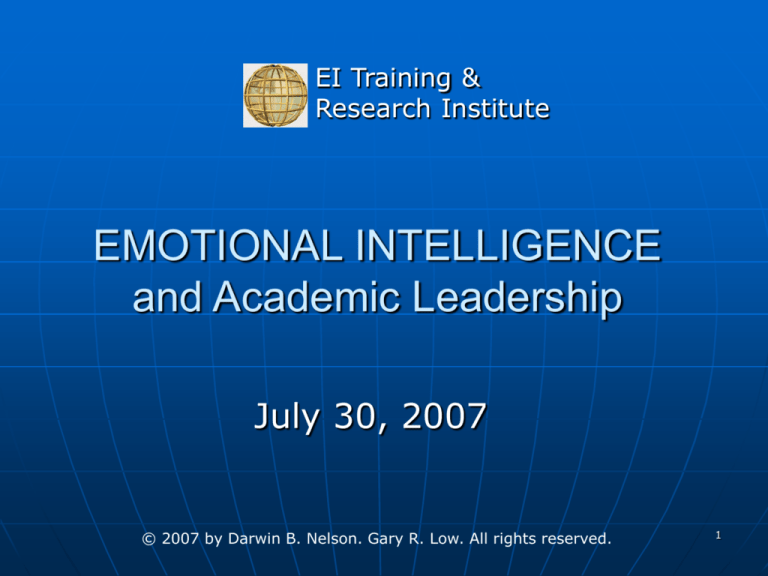
EI Training &
Research Institute
EMOTIONAL INTELLIGENCE
and Academic Leadership
July 30, 2007
© 2007 by Darwin B. Nelson. Gary R. Low. All rights reserved.
1
Inspiration from Cesar Chavez
A Focus on Building Community
“WE CANNOT SEEK ACHIEVEMENT
FOR OURSELVES AND FORGET
ABOUT PROGRESS AND PROSPERITY
FOR OUR COMMUNITY…OUR
AMBITIONS MUST BE BROAD
ENOUGH TO INCLUDE THE
ASPIRATION AND NEEDS OF
OTHERS, FOR THEIR SAKES AND
FOR OUR OWN.”
2
Inspiration from John Gardner
A Focus on Building Self
“WHAT WE MUST REACH FOR IS A
CONCEPTION OF PERPETUAL SELFDISCOVERY, PERPETUAL RESHAPING
TO REALIZE ONE’S BEST SELF, TO BE
THE PERSON ONE COULD BE”
3
Institutional Ways Forward
Quality Enhancement Plans (QEP)
Campus Plans
Grass Roots Initiatives
4
The Education Model of EI
Emerging Model of Darwin Nelson and
Gary Low
• Professors, Educational Leadership and
Counseling, Texas A&M University-Kingsville
Research derived (1977 – Present)
•
•
•
•
Emotional Skills
Achievement and Retention
Personal Excellence
Person/Student Centered
Develops Effective Students & Leaders
Addresses Accountability
5
Personal Outcomes We Hope Students
Exhibit As A Result Of Education?
Personal Responsibility
Work Ethic
Compassion
Reflective/Constructive Reasoning
Meaningful Self-Direction
Life-Long Learning
Intelligent Self Direction
6
Academic Leadership
Outcomes Hoped for Myself
Shared Vision of Student Success
Cooperative Relationships
Professional Development
Collaborative Style
Continuous Learning Organization
Culture of Success
7
EI ≠ IQ
Emotional
Experiential
Reactive
Cognitive
Academic
Rational
8
Emotional Intelligence is …
A Learned Ability To Think
Constructively and Act Wisely
A Model for Healthy Change
A Reflective Process for Life-Long
Transformational Learning
Intelligent Self Direction
9
What is Emotional Intelligence?
Emotional intelligence is a confluence of
developed skills and abilities that
facilitate (a) the accurate knowledge
and value of self, as well as responsible
actions based on personal worth and
dignity; (b) a variety of strong, healthy
relationships; (c) the ability to work
well with others; and (d) productive
reactions to the demands and pressures
of daily life and work.
10
EI Beliefs - We believe that …
… people seek healthful and happy
outcomes and avoid painful ones.
… people seek relationships with others
and their environments.
… interdependence is more important
than independence.
11
EI Beliefs - We believe that …
… effective people develop an ability to
overcome problems & deficits (life-long
learners).
… change occurs best in an engaging
learning environment that is trusting,
positive, honest, caring, and genuine.
… students and adults organize their
worlds from their unique frames of
reference.
12
EI Beliefs - We believe that …
… students need help in learning how to
learn
… students need help in developing
readiness for college expectations and
academic rigor
… students need to be a full and active
partner in the college environment
13
EI Beliefs - We believe that …
… students need to learn how to engage
themselves in classes and programs
… people need to learn and understand
the contributions of the emotional mind
14
Why Is EI Important?
Key to institutional success
Key to academic, career, life, and
leadership success
Students who learn & develop EI
skills achieve at higher levels &
become more engaged
EI centric programs improve
achievement and retention
15
Emotional intelligence is integrative!
Cognitive
Mind
Emotional
Mind
EI
Appropriate
Behavior
Emotional intelligence is the ability to think constructively and act wisely!
16
Do you think emotional intelligence
can and should be taught?
How do you teach and learn EI
skills and competencies?
17
Apply
Learn
Explore
The
Emotional Learning
System
Identify
Understand
18
Emotional Information
Emotionally
Reactive
EXPERIENTIAL MIND
(FEELING)
UNCONSCIOUS
Step D
Self-Development:
Learn
Step A
Self-Assessment:
Explore
©
Step E
Self-Improvement:
Apply & Model
Step C
Self-Knowledge:
Understand
Emotionally
Intelligent
Behavior
Step B
Self-Awareness:
Identify
CONSCIOUS
COGNITIVE MIND
(THINKING)
19
Integrative Approach
to Quality Enhancement
ESAP (Emotional Skills Assessment
Process)
ESAP-CV (College Version)
Intelligent Self-Direction
Personal Excellence Map
20
The Emotional Intelligence
Assessment Process (ESAP)
Four competence areas
•
•
•
•
Interpersonal Communication
Personal Leadership
Self-Management
Intrapersonal Skills
Three potential problem areas
• Aggression
• Deference
• Change Orientation
21
The ESAP Skills
Interpersonal
Assertion
Anger Management
Anxiety Management
Personal Leadership
Comfort
Empathy
Decision Making
Leadership
Self Management
Drive Strength
Time Management
Commitment Ethic
Change Orientation
Intrapersonal
Self Esteem
Stress Management
22
Emotional Intelligence Profile
A Profile of Emotional Skills
Develop
Interpersonal Skills: Assertion
Strengthen
Enhance
9
12
15
18
21
24
27
30
33
36
24
Leadership Skills: Comfort
5
7
9
11
13
15
17
19
21
23
Leadership Skills: Empathy
6
8 10
12
14
16
18
20
22
24
Leadership Skills: Decision Making
5
8
10
12
14
16
18
20
22
24
Leadership Skills: Leadership
4
6
9
11
13
15
17
39
44
49
26
30
34
38
42
44 46
Self Management: Drive Strength
10 14 18 22
Self Management: Time Management
5
8
10
12
14
16
18
20
22
Self Management: Commitment Ethic
8
10
12
14
16
18
20
22
24
29
32
35
39
42
45 48
19
24
29
34
39
44
Intrapersonal: Self Esteem
Intrapersonal: Stress Management
9 18 23 26
4
9
14
Low
Potential Problem Area: Aggression
Normal
50
24
50
49
High
2
4
6
8
11
15
19
24
28
35
Potential Problem Area: Deference
2
4
6
10
14
18
22
26
30
32
36
Potential Problem Area: Change Orientation
1
3
5
7
9
11
13
16
18
21
24
TAMUK First-Year Student Profile
High Achieving Profile
Academic At-Risk Profile
23
Why Is EI Important?
EI skills contribute to academic and
professional achievement. EI skills
promote specific ways of thinking
and behaving that help people
develop leadership, learn more
effectively, use constructive thinking,
and make successful school to
college to career transitions.
24
Time Management
I set specific goals for my career and
my life.
M
S
L
I willingly undertake challenging
projects that involve some risk of
failure.
M
S
L
I am an achiever.
M
S
L
When proceeding with a difficult task,
I think of all the resources that are
available to me in order to
successfully accomplish the task.
M
S
L
25
Commitment Ethic
When something needs to be done,
people turn to me.
M
S
L
I have a strong sense of right and
wrong for myself, and I behave
accordingly.
M
S
L
I am a “hard worker” even when not
supervised.
M
S
L
I rarely fail at anything that I consider
important.
M
S
L
26
Change Orientation
I am not satisfied with the way I
management my time.
M
S
L
One of the things that I need to
change most is how I feel about
myself as a person.
M
S
L
I am not satisfied with my leadership
ability.
M
S
L
One of the things I need to change
most is how I physically take care of
my body.
M
S
L
27
Decision Making
I make decisions and act rather than
worrying about the alternatives and
becoming tense.
M
S
L
When involved in a group project, I
suggest solutions which other group
members accept.
M
S
L
My friends and co-workers ask my help
in making important decisions.
M
S
L
I seldom regret the decisions that I
have made.
M
S
L
28
Transfer of Learning Activity
13 Groups.
Each group experience one EI skill
assessment together.
Within groups, try to come up with a
representative scenario of the role
that the skill has had your work
setting (either positive or negative).
Report out with your scenario and
leadership options.
29
30
31
32
33
34
Community College Examples
Galveston College
Javelina EI Program
College Of The Mainland
San Jacinto College
Coastal Bend College
South Texas College
35
A Day with
Seymour Epstein
Professor emeritus at the University
of Massachusetts.
Constructive Thinking: The Key to
Emotional Intelligence.
National Institute of Mental Health
Research Scientist and Merit award
recipient.
September 14, CC Omni Bayfront
36
EI Institutes & Conferences
2002 – Emotional Intelligence Research Initiative
2004 – Emotional Intelligence: An Education
Based Model
2005 – Emotional Intelligence: Person-Centered
Assessment and Transformative Learning
2006 – Emotional Intelligence: Catch The Wave
2007 – Emotional Intelligence And Leadership: A
Vision Of Excellence
2008 – Personal Excellence: Building Quality
From Within
37
For Additional Information …
http://www.tamuk.edu/edu/kwei000
http://www.EiLearningSys.com
http://www.EITRI.org
Gary@EiLearningSys.com
Gary Low (361) 593-2203
EITRI
The EI Training & Research Institute
38
Galveston College
Nelson & Low Education Model Used In
Quality Enhancement Plan (QEP)
ESAP Assessment Used For Research,
Accountability Data, Evaluation, And
Planning
English Classes
Achieving The Dream
Beverly Gammill and Melanie Johnson
39
College Of The Mainland
Psychology Of Success Class
ESAP Used For Assessment And
Person-centered Instruction
Emotional Intelligence: Achieving
Academic & Career Excellence Book
(Nelson & Low, 2003, Prentice Hall)
Learning Community with EI Focus
Cathy Moran
40
San Jacinto College
ESAP and Emotional Intelligence
book used in MECA
Nursing Program
Developmental Writing
Selected for use in new Foundations
Of Success course (Fall 2007)
Dr. Robert Vela, Jr.
41
Coastal Bend College
COUGAR CAMP
Title V Program
New Critical Thinking Course
(Planning Stages)
Drs. Santos Martinez & Rito Silva, Jr
42
South Texas College
Emotional Intelligence and Teaching
Excellence
South Texas Leadership Academy
Faculty Professional Development
2008 Emotional Intelligence
Research Institute Host
43
Texas A&M University-Kingsville
Emotional Intelligence And
Leadership: A Vision Of Excellence
(Keynote At 2007 Conf)
5 TAMUK Courses Featuring EI
First-year Education Course
Graduate Course For Counselors
3 Doctoral Courses
44
Recent Doctoral Research
Rito Silva, Jr. (TAMU)
Max Abbassi (TAMU-K)
George Potter (TAMU-K)
Marky Smith (TAMU-CC)
Maggie Williams (TAMU-K)
Robert Vela (TAMU-K)
Barbara Stottlemyer (TAMU-K)
45
Recent Doctoral Research
Rito Silva, Jr. (2007).
When asked: “What strategies will be critical for
future Hispanic administrators to utilize in order
to be successful in higher education” 100% of the
panelists responded, “Emotional Intelligence.”
Max Abbassi (2007).
The importance of collaboration, communication
and cooperative problem-solving between
academic chairs and faculty were identified as
keys to effective academic leadership and
institutional success.
46
Recent Doctoral Research
George Potter (2005)
First-year college students who participated in the
EI program outperformed those who did not.
Marky Smith (2004)
The major conclusion was that the EI intervention
program was significantly effective in impacting
change, growth, improvement, and development
in the majority of factors considered (with an atrisk high school sample).
47
Recent Doctoral Research
Maggie Williams (2004)
An examination of the problem of retaining firstyear students at TAMUK. Both academic factors
(ACT/SAT scores, high school class standing) and
the EI Skills of drive strength, time management,
and commitment ethic are significantly
correlated, predicting both retention and
academic achievement.
Robert Vela (2003)
EI skills found to be significant factor in the
academic achievement of first-year college
students.
48
Recent Doctoral Research
Barbara Stottlemyer (2002)
The results of the study showed that there is a
significant relationship between selected
emotional intelligence skills and academic
achievement. The resilience of students who
succeed despite environmental and economic
deficiencies may also be related to emotional
intelligence.
49







